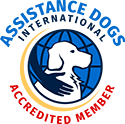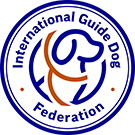TLCAD initiated its At Ease Service Dog program at Camp Pendleton in January of 2011 and has placed three Service Dogs with Wounded Warriors with a fourth dog due to be placed in the next few months. Placing a Service Dog with a Wounded Warrior requires individual evaluation since the common diagnoses for those injured in combat are mobility issues, post-traumatic stress disorder (PTSD) and/or traumatic brain injury (TBI).
Service to those with mobility issues can vary from assistance with balance, retrieval work, summoning help, delivering items, opening and closing doors and drawers, getting the phone, pulling off clothing, retrieving medications, etc. But when it comes to PTSD the assistance needed varies and is now being accepted by both the military and public as a necessary benefit offered by trained Service Dogs. The Americans with Disabilities Act (ADA) has made a policy revision that allows public access for psychiatric Service Dogs if trained for a specific task.
The Service Dog tasks for PTSD are to accomplish the following for a Wounded Warrior to return to the public venue and become productive once again, regaining independence and succeeding in reaching personal goals:
- Modulating the Wounded Warrior’s physiological hyper-reactivity (‘fight or flight’ reaction) when a threat is perceived, as in a crowded mall, for example. The Service Dog calms the Wounded Warrior and helps control the physiological reaction that was lifesaving in the war zone, but not acceptable back home.
- Helping the Wounded Warrior to be able to modulate their rage (commonly associated with fear). Anger is subsided by keeping the physiological changes from escalating. A reaction that was life saving in the war zone, but not at home.Helping the Wounded Warrior to once again frequent places that are challenging for them due to crowds, such as movie theaters and grocery stores.
- Creating a sense of safety for a Wounded Warrior who perceives everything as threatening.
- Dogs are trained to ‘watch their Wounded Warrior’s back’, physically leaning into them when anxiety is escalating, “blocking” or standing between the Wounded Warrior and oncoming people, standing behind the Wounded Warrior when in lines, searching a house before entering, turning on light switches when coming home to a darkened residence and summoning help when needed, for example.
With TBI, needs vary due to the frequent inability to recall words or memories that are needed to function in everyday life, such as remembering to take medications, putting clothes into the dirty clothes hamper, finding keys, retrieving a medical brace device so they can get out of bed, putting shoes away and simply cleaning up a room to pass military inspection. The Service Dog can help with all of these issues, which involves a slower training process than with most clients since training sessions are shorter and more frequent due to memory and focus issues.
The Wounded Warrior’s needs are usually a combination of all of the above diagnoses so each client is treated as an individual with his own separate training plan and personal goals. TLCAD is known for this distinct, customized training and is determined to train each dog to help in the most complete way for each client. TLCAD has produced unique training manuals for each client, to ensure he or she progresses at their own pace and optimal method of learning.
TLCAD Service Dogs are not simply ‘Therapy Dogs’ or ‘Companion Dogs’, but working dogs that assist the individual to do a task that they are no longer able to do themselves. The invisible wounds are now being recognized.
The need for more custom-trained Service Dogs for placement is huge! To meet this expanding need, TLCAD will for the first time hire trainers to help with the foundation training of all our dogs and new trainers. TLCAD has been an all-volunteer organization since its start in 1998 but, as demands grow, TLCAD is progressing to keep pace with the needs of those who have proudly served our country.







